Table of content:
The real estate industry is highly competitive and dynamic, and professionals in this field can benefit from a variety of tools to streamline processes, improve efficiency, and stay ahead of the competition. Here are five essential tools that everyone in the real estate industry should consider using:
- Real Estate CRM (Customer Relationship Management) Software:
- CRM software helps real estate professionals manage client relationships, track leads, and streamline communication. It allows you to store client information, schedule follow-ups, and automate email campaigns. Popular options include Salesforce, Zoho CRM, and HubSpot CRM.
- Property Listing Platforms:
- To showcase properties to potential buyers or renters, real estate agents should utilize property listing platforms like Zillow, Realtor.com, or MLS (Multiple Listing Service). These platforms can increase visibility for listings and attract more inquiries.
- Real Estate Management Software:
- Real estate management software such as Buildium or AppFolio is essential for property managers and landlords. It helps with tasks like rent collection, property maintenance tracking, and financial reporting.
- Virtual Tour and 3D Modeling Tools:
- Virtual tours and 3D modeling tools like Matterport can provide potential buyers or renters with immersive property experiences. These tools allow clients to explore properties remotely, saving time for both agents and clients.
- Market Research and Analytics Tools:
- Real estate professionals need access to market data and analytics to make informed decisions. Tools like CoreLogic, Redfin, or local MLS services can provide valuable insights into property values, market trends, and demographics.
- Real Estate Investment Software (Optional):
- For investors in the real estate industry, specialized investment software like REIPro or RealPage can help analyze potential deals, calculate returns, and manage property portfolios efficiently.
- Digital Signature Platforms:
- Digital signature platforms like DocuSign or Adobe Sign simplify the signing of contracts and documents, reducing paperwork and expediting the closing process.
- Social Media and Marketing Tools:
- Real estate professionals should use social media platforms (e.g., Facebook, Instagram, LinkedIn) and marketing tools (e.g., Buffer, Hootsuite) to promote listings, engage with clients, and build their online presence.
- Financial and Accounting Software:
- Real estate agents, property managers, and investors can benefit from accounting software like QuickBooks or FreshBooks to manage finances, track expenses, and generate financial reports.
- Communication and Collaboration Tools:
- Efficient communication and collaboration are crucial in real estate. Tools like Slack, Microsoft Teams, or Trello can help teams coordinate activities, share documents, and stay organized.
- Property Valuation and Estimation Tools:
- Tools like Zillow’s Zestimate, Realtor.com’s Home Value Estimator, or more specialized software can help professionals estimate property values and provide accurate pricing guidance to clients.
- Customer Engagement and Feedback Tools:
- Gathering feedback from clients is essential for improving services. Tools like SurveyMonkey or Google Forms can be used to collect feedback and gauge client satisfaction.
- Legal and Compliance Software:
- To ensure legal compliance, real estate professionals can use software like Dotloop or ZipForm for creating, storing, and managing real estate contracts and documents securely.
The choice of tools may vary depending on the specific role within the real estate industry, whether you’re an agent, broker, property manager, investor, or developer. It’s crucial to evaluate your needs and select the tools that best suit your objectives and workflow. Additionally, staying up-to-date with technological advancements in the real estate sector is essential to remain competitive in the market.
Real Estate CRM (Customer Relationship Management) Software:
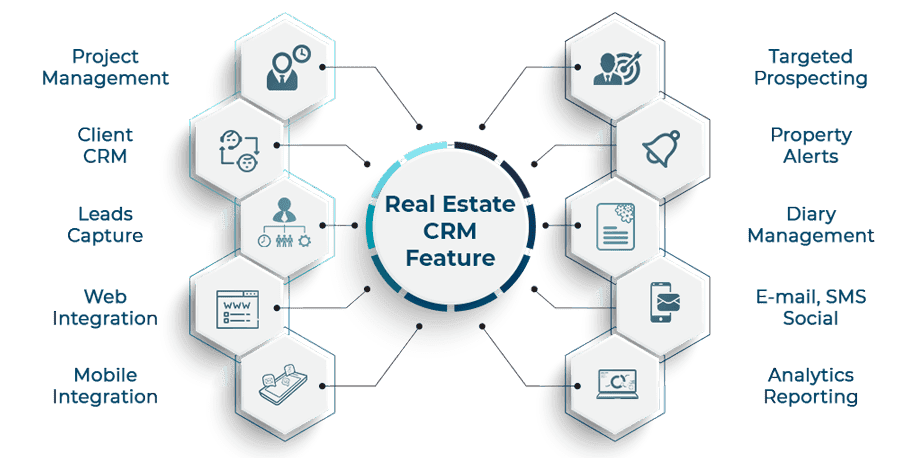
Real Estate CRM (Customer Relationship Management) software is a specialized tool designed to help real estate professionals manage and optimize their interactions with clients, leads, and properties. Here are some key details and insights about Real Estate CRM software:
- Client Management: Real Estate CRM software allows you to store detailed information about your clients, including contact details, communication history, preferences, and transaction history. This helps you provide personalized services and improve client satisfaction.
- Lead Tracking: It helps you capture, organize, and track leads generated from various sources, such as website inquiries, social media, and open houses. You can prioritize leads based on their readiness to buy or sell.
- Property Listings: Many Real Estate CRM systems integrate with property listing platforms and MLS services to enable automatic updates of property listings. This ensures that you have access to the most current property information to share with clients.
- Communication Tools: These CRM tools often include email marketing, templates, and automation features, allowing you to send personalized emails and newsletters to clients and leads. You can also schedule follow-up emails or reminders.
- Task and Appointment Management: Real Estate CRM software helps you schedule and manage tasks, appointments, and property showings. It can send reminders and notifications to help you stay organized and on top of your schedule.
- Document Management: You can upload, store, and organize important documents like contracts, agreements, and property documents within the CRM. This makes it easy to access and share documents with clients and colleagues.
- Analytics and Reporting: Most CRM systems provide analytics and reporting features that allow you to track the performance of your marketing campaigns, lead conversion rates, and other key metrics. This data helps you make data-driven decisions.
- Mobile Accessibility: Many Real Estate CRM software solutions offer mobile apps, enabling real estate professionals to access client information, leads, and appointments while on the go. This is especially useful for agents who spend a lot of time in the field.
- Integration Capabilities: CRM systems can integrate with other tools and software you use in your real estate business, such as accounting software, marketing automation tools, and virtual tour platforms, to streamline your workflow.
- Security and Compliance: Real Estate CRM software often comes with robust security features to protect sensitive client data and ensure compliance with industry regulations, such as data privacy laws.
- Customization: Many CRM systems allow you to customize fields and workflows to match your specific business needs. This flexibility ensures that the CRM aligns with your unique processes.
Popular Real Estate CRM software options include Salesforce, Zoho CRM, HubSpot CRM, and more. Choosing the right CRM for your real estate business will depend on your specific requirements, budget, and the scale of your operations. Implementing a CRM can significantly enhance your efficiency, organization, and client relationships in the competitive real estate industry.
Property Listing Platforms:
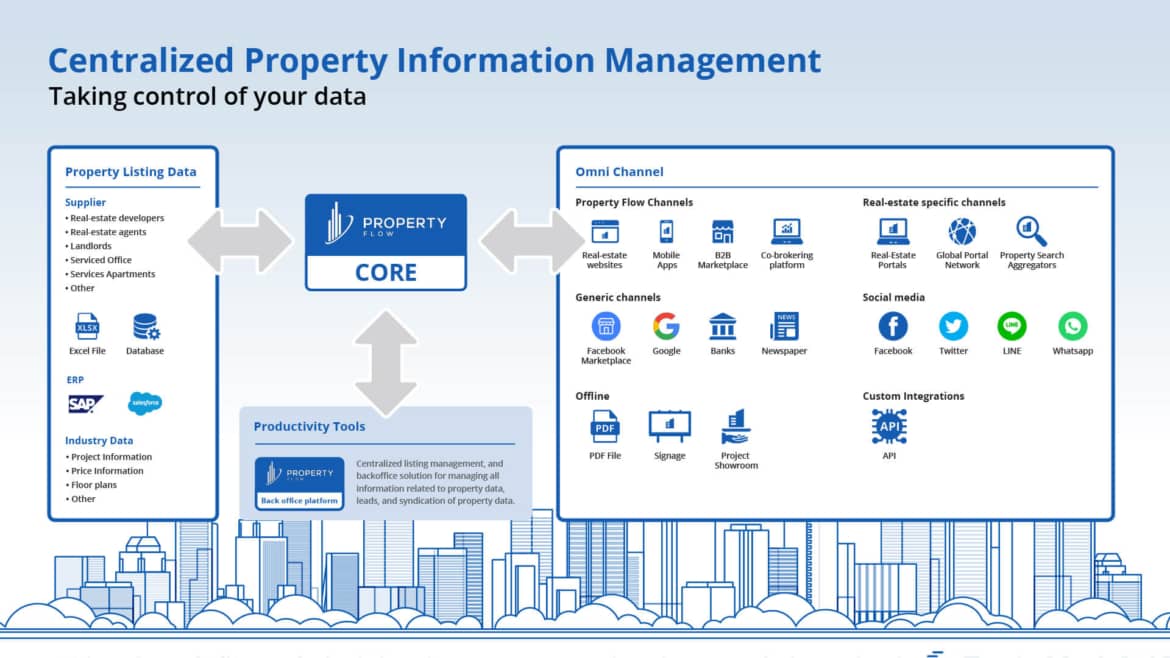
Property Listing Platforms are essential tools in the real estate industry that allow professionals to list and market properties to potential buyers or renters. Here are some details and insights about Property Listing Platforms:
- Property Database: Property listing platforms serve as extensive databases of real estate listings. They contain detailed information about properties, including price, location, size, features, and high-quality images.
- Search and Filter Options: These platforms offer robust search and filtering options, enabling users to narrow down their property search based on specific criteria such as location, price range, property type, and amenities.
- Photos and Virtual Tours: Property listings typically include high-resolution photos and, in some cases, virtual tours. These visual elements provide potential buyers or renters with a comprehensive view of the property, helping them make informed decisions.
- Listing Analytics: Many property listing platforms offer analytics tools that provide insights into listing performance. Users can track views, inquiries, and other engagement metrics to assess the effectiveness of their listings.
- User-Friendly Interfaces: These platforms are designed to be user-friendly, making it easy for real estate professionals to create and manage property listings. Intuitive interfaces streamline the listing process.
- Map-Based Search: Map-based search features allow users to explore properties in a specific geographic area. This is especially helpful for clients who have location preferences or are unfamiliar with a particular area.
- Agent Profiles: Real estate agents and brokers often have profiles on these platforms, which can include their credentials, reviews from past clients, and contact information. This helps clients find and connect with experienced professionals.
- Alerts and Notifications: Users can set up alerts and notifications to receive updates when new listings matching their criteria become available. This keeps them informed about the latest properties on the market.
- Integration with CRM Systems: Some property listing platforms offer integration with Customer Relationship Management (CRM) systems, making it easier for real estate professionals to manage client inquiries and leads.
- Market Insights: Some platforms provide market insights and trends, helping users stay informed about the current state of the real estate market in a particular area.
- Accessibility: Many property listing platforms offer mobile apps, ensuring that users can access listings and updates on the go. This is especially valuable for real estate agents who frequently work outside the office.
- Lead Generation: Real estate professionals can use these platforms to generate leads as potential buyers or renters inquire about properties. Effective lead management is crucial for converting inquiries into sales or rentals.
Popular property listing platforms include Zillow, Realtor.com, Redfin, Trulia, and MLS (Multiple Listing Service) platforms. Real estate professionals often use a combination of these platforms to maximize exposure for their listings and connect with a broader audience. The choice of platforms may vary depending on location and target market, so it’s essential to research and select the most suitable options for your specific needs.
Real Estate Management Software:
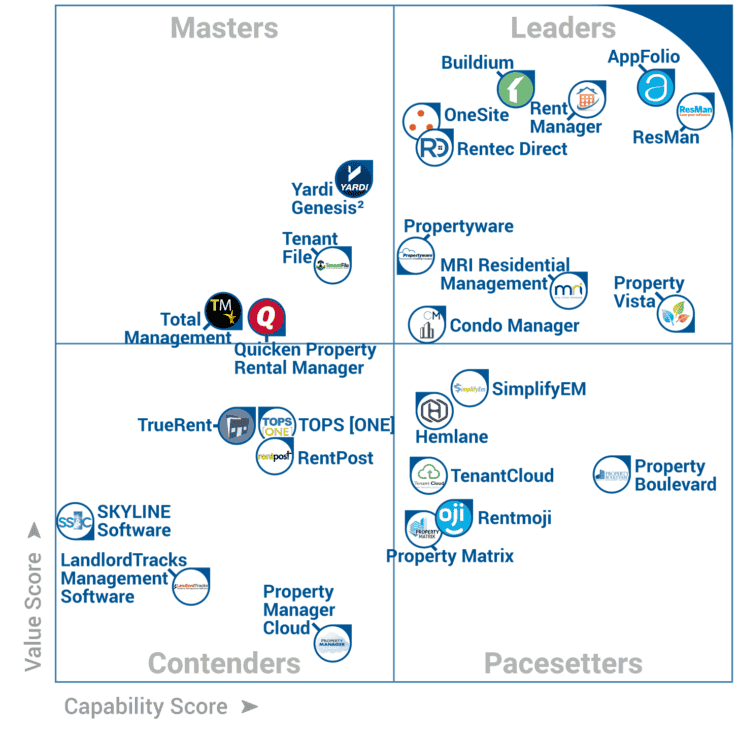
Real Estate Management Software is a valuable tool used by property managers, landlords, and real estate professionals to efficiently manage their properties and associated tasks. Here are some details and insights about Real Estate Management Software:
- Property Portfolio Management: Real Estate Management Software allows users to centralize and manage their entire property portfolio from a single platform. This includes residential, commercial, and industrial properties.
- Lease and Tenant Management: Users can store lease agreements, tenant details, and rental histories. The software typically includes features for rent collection, lease renewals, and tracking rent payments.
- Maintenance and Repairs: Property managers can schedule and track maintenance and repair tasks for each property. This includes routine maintenance as well as handling tenant-reported issues.
- Financial Management: Real Estate Management Software helps users maintain accurate financial records. It tracks income and expenses, generates financial reports, and handles accounting tasks such as payroll and invoicing.
- Tenant Portals: Many software solutions offer tenant portals where renters can access important information, pay rent online, and submit maintenance requests, improving communication and convenience for both tenants and property managers.
- Document Management: Users can securely store and organize important documents related to properties, leases, and legal agreements. This can help streamline audits and compliance checks.
- Property Inspections: Some software includes tools for conducting property inspections, allowing property managers to assess the condition of properties and identify maintenance needs.
- Marketing and Advertising: Real Estate Management Software may include features for marketing vacant properties. Users can create listings, post them on property listing websites, and track inquiries and applications.
- Tenant Screening: To ensure quality tenants, some software offers tenant screening services, including background checks and credit reports.
- Compliance and Reporting: Real Estate Management Software helps users stay compliant with local regulations and reporting requirements. It can generate reports for taxes, property performance, and more.
- Integration with Accounting Software: Many solutions integrate with popular accounting software like QuickBooks or provide their own accounting features, simplifying financial management.
- Work Order Management: Property managers can create, assign, and track work orders for maintenance and repairs, streamlining the process of addressing tenant requests.
- Security and Access Control: These systems often come with security features to protect sensitive data and restrict access to authorized personnel only.
- Scalability: Real Estate Management Software is scalable, meaning it can accommodate property portfolios of various sizes, from a single rental property to large multifamily complexes.
- Mobile Accessibility: Some solutions offer mobile apps, allowing property managers to access critical information and perform tasks while on the go.
Popular Real Estate Management Software options include Buildium, AppFolio, Yardi, and Propertyware, among others. The choice of software depends on the specific needs of property managers and the size and complexity of their portfolios. Real Estate Management Software can significantly enhance efficiency, organization, and tenant satisfaction for property management professionals.
Virtual Tour and 3D Modeling Tools:
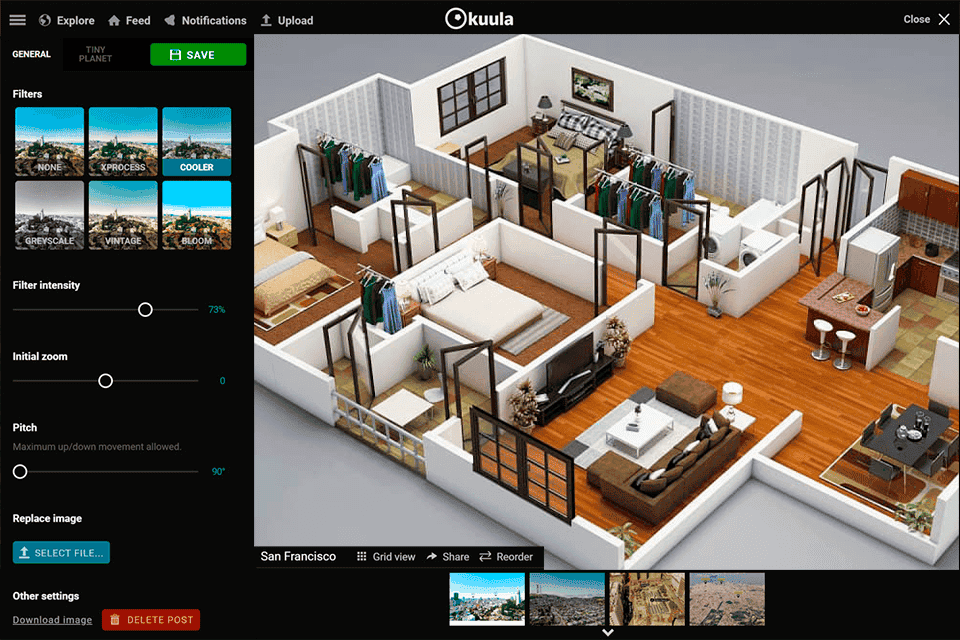
Virtual Tour and 3D Modeling Tools are essential technologies in the real estate industry, enabling professionals to create immersive property experiences for potential buyers or renters. Here are details and insights about these tools:
- Virtual Tours: Virtual tour tools allow real estate professionals to create 360-degree panoramic views of properties. These tours provide a comprehensive and immersive experience for potential buyers or renters.
- 3D Modeling: 3D modeling tools enable the creation of three-dimensional representations of properties, including interior and exterior spaces. This technology offers a realistic and detailed view of the property.
- Interactive Navigation: Virtual tour and 3D modeling tools often include interactive navigation features, allowing viewers to move through the property as if they were physically present. This can include zooming, panning, and rotating to explore every angle.
- Floor Plans: Some tools integrate floor plans into virtual tours or 3D models, giving viewers a better understanding of the property’s layout and dimensions.
- High-Quality Imagery: These tools typically support high-resolution images and can capture details with exceptional clarity, providing a realistic representation of the property.
- Compatibility: Virtual tour and 3D modeling tools are often compatible with various devices, including smartphones, tablets, and VR headsets, ensuring accessibility for a wide audience.
- Remote Viewing: Potential buyers or renters can view properties remotely, saving time and reducing the need for physical property visits, especially valuable for long-distance or international clients.
- Engagement and Marketing: These tools enhance property marketing efforts, attracting more potential buyers or renters. They can be integrated into property listings on websites and social media.
- Time-Saving: Virtual tours and 3D models can expedite the decision-making process for clients by allowing them to explore properties at their own pace.
- Cost Savings: These tools can potentially reduce costs associated with in-person property visits and staging by offering a virtual alternative.
- Architectural Visualization: 3D modeling tools are often used by architects and builders to showcase design concepts and renovations to clients.
- Property Documentation: Real estate professionals can use virtual tours and 3D models to document the condition of a property at the time of listing, helping to avoid disputes or misunderstandings later.
- Integration with Real Estate Platforms: Many virtual tour and 3D modeling tools can be integrated with property listing platforms, making it easy to showcase properties to a broader audience.
- Customization: Users can often customize virtual tours and 3D models to highlight specific features of a property or provide additional information.
Popular virtual tour and 3D modeling tools include Matterport, 3D Vista, EyeSpy360, and Zillow 3D Home. Real estate professionals can choose the tool that best aligns with their specific needs and budget to enhance their property marketing efforts and provide clients with an engaging and informative experience.
Market Research and Analytics Tools:

Market Research and Analytics Tools play a crucial role in the real estate industry by providing professionals with data-driven insights and trends. Here are details and insights about these tools:
- Data Aggregation: Market research and analytics tools gather and aggregate data from various sources, including property transactions, demographics, economic indicators, and consumer behavior.
- Property Valuation: These tools often include property valuation models and algorithms that help real estate professionals estimate property values accurately. This information is vital for pricing properties competitively.
- Market Trends: Market research tools provide up-to-date information on market trends, including changes in property prices, demand for specific property types, and shifts in buyer preferences.
- Competitive Analysis: Real estate professionals can use these tools to analyze their competition, identify market gaps, and develop competitive strategies.
- Demographic Data: Access to demographic data, such as population growth, income levels, and age demographics, helps real estate professionals understand the target market and make informed investment decisions.
- Location Analysis: Tools often offer features for location analysis, allowing users to assess the desirability of a specific area based on factors like crime rates, schools, amenities, and transportation options.
- Predictive Analytics: Some tools use predictive analytics to forecast future market trends, property values, and investment opportunities, helping users make proactive decisions.
- Risk Assessment: Market research tools can help assess the potential risks associated with a real estate investment, including factors like market volatility and economic conditions.
- Portfolio Analysis: For investors with multiple properties, these tools offer portfolio analysis features to track the performance of their real estate assets and make strategic decisions regarding portfolio diversification.
- Market Reports: Users can generate detailed market reports that include data on property sales, rental rates, vacancy rates, and other key metrics. These reports are valuable for presentations and client consultations.
- Investment Analysis: Real estate professionals can use analytics tools to evaluate the financial viability of potential investments. This includes assessing cash flow, return on investment (ROI), and cap rates.
- Customization: Many tools allow users to customize their analyses to focus on specific property types, locations, or market segments.
- Integration: Some market research and analytics tools integrate with other real estate software, including CRM systems and property listing platforms, to streamline data management.
- Data Visualization: Visualizations such as charts, graphs, and heatmaps make it easier to understand complex market data and trends.
Popular market research and analytics tools for real estate professionals include CoreLogic, Redfin, Zillow, and local MLS (Multiple Listing Service) platforms. Choosing the right tool depends on the specific needs of the real estate professional, whether they are an agent, investor, or developer. These tools provide valuable insights that empower professionals to make informed decisions in a highly competitive and dynamic market.
Real Estate Investment Software (Optional):
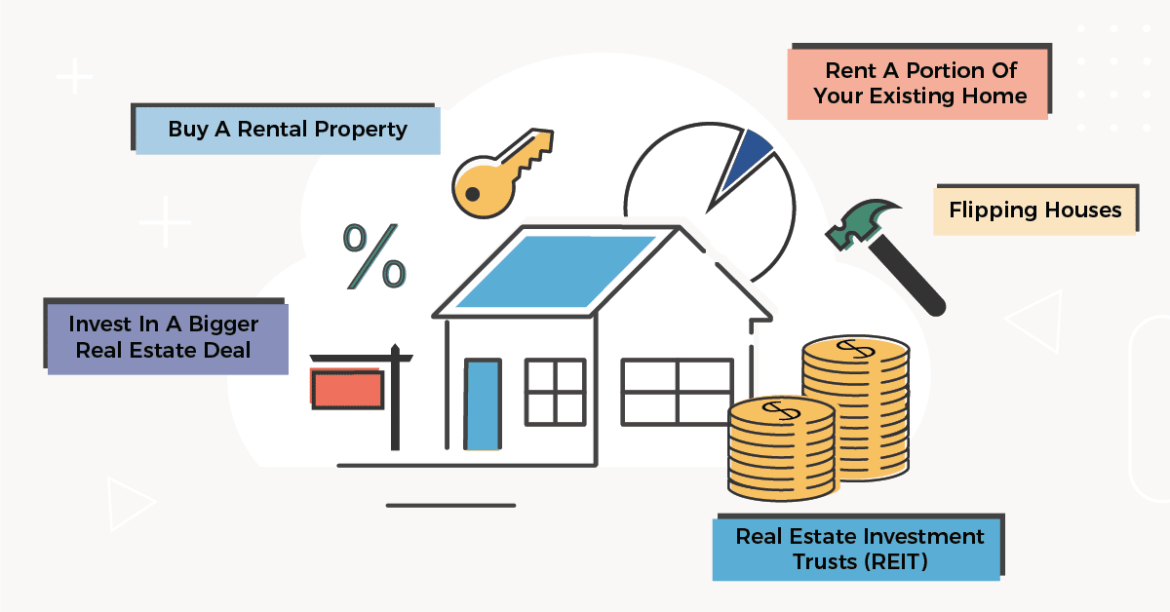
Real Estate Investment Software is an optional but highly valuable tool for real estate investors, whether they are individuals, institutions, or real estate investment firms. Here are details and insights about Real Estate Investment Software:
- Property Analysis: Real Estate Investment Software allows users to analyze potential investment properties thoroughly. This includes evaluating property values, rental income, operating expenses, and projected cash flow.
- Financial Modeling: These tools often include financial modeling features that help investors calculate key financial metrics such as cap rate, cash-on-cash return, internal rate of return (IRR), and net present value (NPV).
- Scenario Analysis: Users can perform “what-if” scenarios to assess how changes in factors like property price, financing terms, or rental income might impact their investment’s performance.
- Market Research Integration: Many investment software solutions integrate market research data to provide investors with insights into market trends, property values, and potential growth areas.
- Risk Assessment: Real Estate Investment Software helps investors assess the risks associated with a particular property or portfolio, including market volatility, financing risks, and economic factors.
- Property Management Integration: Some tools integrate with property management software, allowing investors to seamlessly manage their properties and monitor financial performance.
- Portfolio Management: For investors with multiple properties, these tools offer portfolio management features to track the performance of their investments as a whole.
- Tax Analysis: Investors can analyze the tax implications of their investments, including deductions, depreciation, and potential tax benefits.
- Financing Analysis: Users can evaluate different financing options, such as mortgages or loans, and determine how they impact their investment’s profitability.
- Deal Sourcing: Some software solutions offer deal-sourcing features, helping investors find potential investment opportunities through various channels.
- Customization: Real Estate Investment Software often allows users to customize their analyses to suit their specific investment strategies and objectives.
- Document Management: Users can store and organize important documents related to their investments, such as contracts, lease agreements, and financial statements.
- Integration with Accounting Software: Many investment software tools integrate with popular accounting software like QuickBooks or provide their own accounting features to streamline financial management.
- Reporting: Users can generate detailed investment reports and presentations to share with stakeholders or partners.
- Compliance: Real Estate Investment Software often includes features to help investors stay compliant with regulations and reporting requirements.
Popular Real Estate Investment Software options include ARGUS, RealPage Investment Accounting, and Yardi Investment Management, among others. The choice of software depends on the specific needs of the investor, the scale of their investments, and their preferred investment strategy. These tools are invaluable for making informed investment decisions, optimizing portfolio performance, and mitigating risks in the real estate investment landscape.
Digital Signature Platforms:
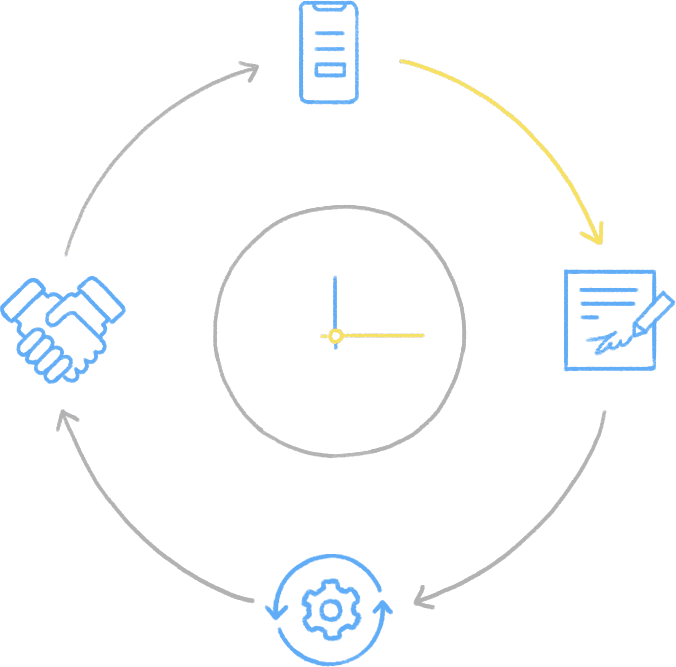
Digital Signature Platforms are essential tools in the real estate industry and many other sectors for securely signing and managing electronic documents. Here are details and insights about Digital Signature Platforms:
- Electronic Signatures: Digital signature platforms allow users to sign documents electronically, eliminating the need for physical signatures. This streamlines the document signing process and reduces paperwork.
- Legally Binding: Signatures created with digital signature platforms are legally binding in many jurisdictions, provided they meet certain security and authentication standards, such as those defined in the Electronic Signatures in Global and National Commerce (ESIGN) Act and the Uniform Electronic Transactions Act (UETA).
- Security: These platforms use advanced encryption and authentication methods to ensure the security and integrity of electronically signed documents. This includes secure storage of signature certificates and audit trails.
- User-Friendly: Digital signature platforms are designed to be user-friendly, making it easy for signers to add their signatures to documents using a computer, tablet, or smartphone.
- Cloud-Based: Many platforms are cloud-based, allowing users to access and sign documents from anywhere with an internet connection. This is especially valuable for remote or mobile professionals.
- Multi-Party Signing: These platforms support multi-party signing, enabling multiple signers to electronically sign a single document, even if they are in different locations.
- Document Workflow: Users can create document workflows that specify the order in which signatures are obtained and the recipients of signed copies, ensuring efficient document routing.
- Templates: Users can create and save document templates for commonly used forms, contracts, or agreements, saving time on repetitive paperwork.
- Audit Trails: Digital signature platforms maintain detailed audit trails that record every action taken with a document, including when it was sent, opened, and signed. This is crucial for compliance and legal purposes.
- Integration: Many platforms integrate with other software commonly used in real estate, such as document management systems, CRM software, and transaction management tools.
- Mobile Apps: Some platforms offer mobile apps for on-the-go document signing and management.
- Remote Notarization: In some jurisdictions, digital signature platforms can facilitate remote notarization, allowing notaries to verify signatures electronically.
- Compliance: Digital signature platforms often comply with industry-specific regulations, such as those set forth by the National Association of Realtors (NAR) and other real estate authorities.
- Cost and Time Savings: These platforms can significantly reduce the time and cost associated with printing, mailing, and scanning paper documents.
Popular Digital Signature Platforms for real estate professionals include DocuSign, Adobe Sign, HelloSign, and SignEasy, among others. Choosing the right platform depends on your specific needs, the volume of documents you handle, and your preferred level of integration with other software. Digital signature platforms have become essential in modern real estate transactions, offering convenience, security, and efficiency in the document signing process.
Social Media and Marketing Tools:

Social Media and Marketing Tools are essential for real estate professionals to promote listings, engage with clients, and build their online presence. Here are details and insights about these tools:
- Social Media Platforms: These tools encompass popular social media platforms such as Facebook, Instagram, Twitter, LinkedIn, and YouTube, which real estate professionals use to connect with their audience.
- Content Creation: Social media and marketing tools often include features for creating and scheduling posts, videos, and images to engage with the target audience. Users can plan and publish content ahead of time.
- Audience Targeting: Real estate professionals can target specific demographics and geographic locations with their social media advertisements and content to reach potential clients effectively.
- Ad Campaigns: Many platforms offer advertising options, allowing users to boost posts or run targeted ad campaigns to increase visibility and generate leads.
- Analytics: Social media and marketing tools provide insights into the performance of posts and ads. Users can track engagement metrics like likes, shares, comments, and click-through rates to assess the effectiveness of their marketing efforts.
- Social Media Management: These tools often offer central dashboards to manage multiple social media accounts from a single interface, streamlining the posting and monitoring process.
- Content Scheduling: Users can schedule posts in advance, ensuring a consistent and timely social media presence even during busy periods.
- Lead Generation: Social media and marketing tools can help capture leads through lead generation forms and contact information collected from potential clients interested in real estate services.
- Engagement and Community Building: Real estate professionals can engage with their audience by responding to comments and messages, fostering a sense of community, and building trust.
- Branding: These tools enable users to maintain a consistent brand image by using branded templates, logos, and colors in their social media posts and marketing materials.
- Content Management: Users can store and organize marketing materials, images, and videos for easy access when creating social media content.
- Competitor Analysis: Some tools provide insights into competitors’ social media strategies, helping users identify opportunities and trends in the market.
- Email Marketing Integration: Integration with email marketing tools allows users to synchronize their email campaigns with social media efforts, ensuring consistent messaging.
- Social Media Advertising Budgeting: Users can set and manage advertising budgets for their social media campaigns, optimizing spending for maximum reach and engagement.
- Compliance: Real estate professionals must adhere to industry regulations when advertising properties. Some tools offer compliance features to ensure that all marketing materials meet legal requirements.
Popular Social Media and Marketing Tools include Hootsuite, Buffer, Sprout Social, Canva (for content creation), and Mailchimp (for email marketing integration). Choosing the right tools depends on your marketing strategy, target audience, and budget. An effective social media and marketing strategy can help real estate professionals connect with clients, showcase properties, and ultimately drive sales in a competitive market.
Financial and Accounting Software:
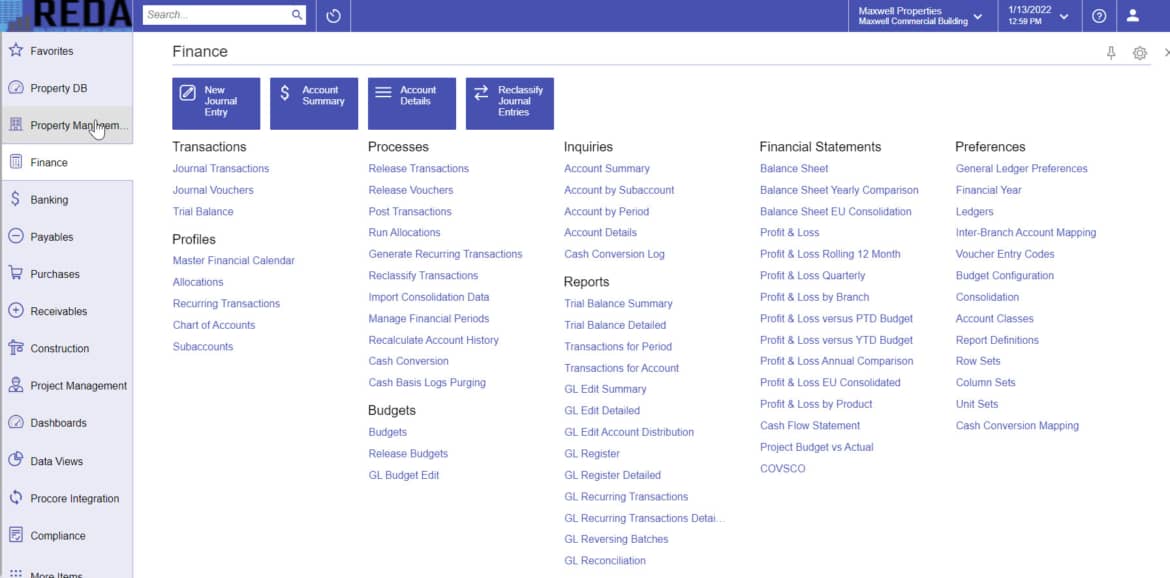
Financial and Accounting Software is crucial for real estate professionals, property managers, and investors to manage their finances, track expenses, and generate accurate financial reports. Here are details and insights about these tools:
- Expense Tracking: Financial and accounting software allows users to record and categorize expenses related to property management or real estate transactions. This includes expenses like maintenance, repairs, utilities, property taxes, and mortgage payments.
- Income Tracking: Users can track rental income, lease payments, commissions, and other sources of revenue. The software helps ensure all income is accounted for and properly recorded.
- Bookkeeping: These tools provide double-entry bookkeeping capabilities, ensuring accurate and balanced financial records.
- Bank Reconciliation: Users can reconcile bank and credit card statements, ensuring that financial records match actual bank transactions.
- Invoicing: For property managers and real estate professionals who bill clients or tenants, invoicing features help create and send invoices, track payments, and manage accounts receivable.
- Financial Reporting: Financial and accounting software generates various financial reports, including income statements, balance sheets, cash flow statements, and profit and loss statements. These reports provide insights into financial performance.
- Budgeting and Forecasting: Users can create and manage budgets for properties or portfolios, as well as forecast future income and expenses based on historical data.
- Tax Preparation: Many software solutions include tax preparation features, simplifying tax filing by generating tax-ready financial reports and tracking deductible expenses.
- Integration with Bank Accounts: These tools often integrate with bank accounts and financial institutions, allowing for automated data import and transaction categorization.
- Multi-Currency Support: For international transactions, some software supports multiple currencies, simplifying financial management for global real estate portfolios.
- Vendor and Supplier Management: Users can manage vendor information, track payments to suppliers, and ensure timely payment of bills.
- Document Management: These tools often offer document storage and management features for financial records, invoices, receipts, and contracts.
- Data Security: Financial and accounting software prioritize data security, offering encryption, user access controls, and secure data storage to protect sensitive financial information.
- Audit Trail: Detailed audit trails provide a history of all financial transactions and changes, enhancing transparency and accountability.
- Compliance: Many software solutions adhere to industry-specific regulations, such as Generally Accepted Accounting Principles (GAAP) or International Financial Reporting Standards (IFRS).
Popular Financial and Accounting Software options include QuickBooks, Xero, FreshBooks, and Wave, among others. The choice of software depends on the specific needs of the real estate professional or property manager, the size of the portfolio, and the complexity of financial transactions. Effective financial and accounting management is crucial for maintaining profitability, ensuring tax compliance, and making informed financial decisions in the real estate industry.
Communication and Collaboration Tools:

Communication and Collaboration Tools are essential for real estate professionals, property managers, and teams to streamline communication, coordinate activities, and work efficiently. Here are details and insights about these tools:
- Email: Email is a fundamental communication tool for real estate professionals. It’s used for client communication, sending property listings, and sharing important documents.
- Instant Messaging: Instant messaging platforms like Slack, Microsoft Teams, or WhatsApp enable real-time communication within teams. They facilitate quick exchanges of information and allow for group chats.
- Video Conferencing: Video conferencing tools like Zoom, Microsoft Teams, and Google Meet are crucial for virtual meetings with clients, team members, and colleagues, especially when in-person meetings are not feasible.
- File Sharing and Storage: Tools like Dropbox, Google Drive, and Microsoft OneDrive allow for secure file sharing and storage of documents, photos, videos, and other essential files.
- Collaborative Document Editing: Platforms like Google Workspace (formerly G Suite) and Microsoft Office 365 enable real-time collaboration on documents, spreadsheets, and presentations, making it easy for teams to work together remotely.
- Task Management: Task management tools like Trello, Asana, or Monday.com help teams organize and prioritize tasks, track progress, and meet deadlines efficiently.
- Calendar and Scheduling: Calendar apps like Google Calendar or Microsoft Outlook assist in scheduling appointments, property showings, and client meetings. They can also send reminders and integrate with other collaboration tools.
- Customer Relationship Management (CRM) Integration: Integrating communication tools with CRM software allows real estate professionals to access client information, notes, and communication history during client interactions.
- Virtual Phone Systems: Virtual phone systems, such as RingCentral or Grasshopper, offer professional phone solutions with features like call forwarding, voicemail, and call recording.
- Project Management: Project management tools like Basecamp or Wrike help real estate teams manage complex projects, track progress, and allocate resources effectively.
- Video Messaging: Video messaging platforms like BombBomb or Loom allow real estate professionals to send personalized video messages to clients, providing a more engaging and personal touch.
- Document Signing and Collaboration: Some collaboration tools integrate with digital signature platforms (e.g., DocuSign) to streamline document signing and approval processes.
- Group Calendars: Group calendar tools like Teamup or Meetup help teams coordinate schedules and events, making it easier to plan property showings and team meetings.
- Secure Communication: Security-focused communication tools ensure that sensitive client information and transaction details are protected through encryption and access controls.
- Integration Capabilities: Many communication and collaboration tools offer integrations with other software, such as CRM systems, project management tools, and marketing platforms, to create a seamless workflow.
Choosing the right communication and collaboration tools depends on the specific needs and preferences of real estate professionals and teams. These tools are essential for enhancing teamwork, improving client interactions, and maintaining productivity, especially in a field where effective communication is critical for success.
Property Valuation and Estimation Tools:
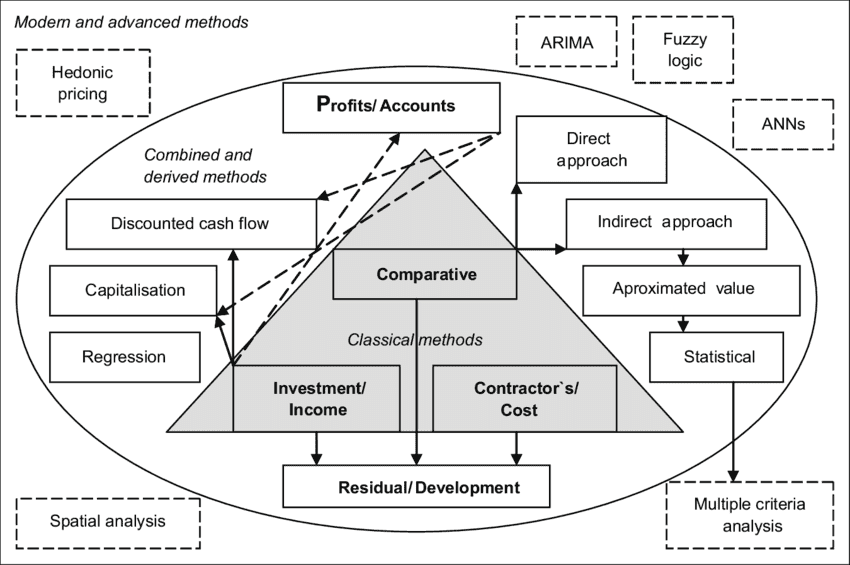
Property Valuation and Estimation Tools are essential for real estate professionals, property appraisers, investors, and homeowners to determine the value of properties accurately. Here are details and insights about these tools:
- Automated Valuation Models (AVMs): AVMs use mathematical modeling and statistical analysis to estimate property values based on factors such as location, property size, recent sales data, and market trends. They provide quick and automated property valuations.
- Comparative Market Analysis (CMA): CMAs are used by real estate agents to estimate a property’s value by comparing it to similar properties (comparables) that have recently sold in the same area. CMAs consider factors like location, property condition, and market conditions.
- Appraisal Software: Property appraisers use specialized appraisal software to assess property values. These tools help appraisers collect and analyze data, generate appraisal reports, and ensure compliance with industry standards.
- MLS Data Analysis: Real estate professionals often access Multiple Listing Service (MLS) data to evaluate property values. MLS data includes information about properties currently on the market, recent sales, and historical property data.
- Geographic Information Systems (GIS): GIS technology helps professionals analyze spatial data, including property values, neighborhood characteristics, zoning regulations, and land use patterns. GIS tools provide valuable insights for property valuation.
- Online Property Valuation Tools: Various websites and online platforms offer property valuation tools that provide estimated property values based on publicly available data. Examples include Zillow’s Zestimate and Redfin’s Estimate.
- Property Inspection Tools: Some property valuation tools include features for conducting property inspections and recording data about the property’s condition and features, which can impact its value.
- Data Analysis and Modeling: Advanced property valuation tools may employ data analysis techniques and predictive modeling to provide more accurate property valuations. Machine learning algorithms can identify patterns and trends in property data.
- Historical Sales Data: Property valuation tools often consider historical sales data to assess how property values have changed over time, helping users understand market trends and fluctuations.
- Local Market Knowledge: Successful property valuation often relies on local market knowledge and expertise. Professionals take into account factors specific to the local real estate market that may not be captured by automated tools.
- Regulatory Compliance: Property valuation tools used by appraisers must comply with industry standards and regulations, such as the Uniform Standards of Professional Appraisal Practice (USPAP).
- Property Condition Assessment: In addition to property value, some tools assess the condition of a property, which can impact its marketability and value.
- Customization: Users can often customize property valuation tools to consider specific property features or factors that may not be accounted for in standard valuations.
Property Valuation and Estimation Tools vary in complexity and purpose, from simple online calculators to comprehensive appraisal software used by licensed appraisers. Real estate professionals and property owners should choose the tool or approach that best aligns with their specific needs and the level of accuracy required for their valuation tasks.
Customer Engagement and Feedback Tools:
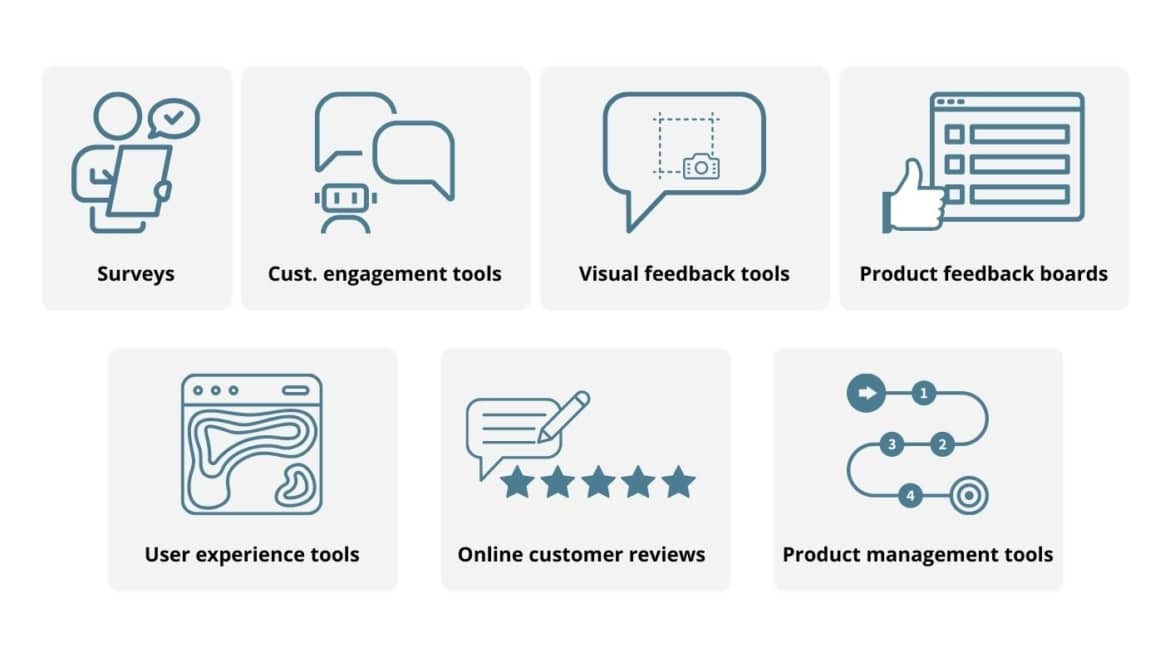
Customer Engagement and Feedback Tools are essential for real estate professionals and companies to build strong relationships with clients, gather valuable feedback, and enhance their services. Here are details and insights about these tools:
- Client Relationship Management (CRM) Software: CRM software is at the core of customer engagement in real estate. It helps agents and companies manage client interactions, track communication history, and provide personalized service.
- Email Marketing Platforms: Email marketing tools allow real estate professionals to send newsletters, property updates, and personalized messages to clients, keeping them informed and engaged.
- Social Media Engagement: Social media platforms like Facebook, Instagram, and LinkedIn enable real estate professionals to engage with clients through posts, comments, and direct messages. These platforms also facilitate targeted advertising to reach a wider audience.
- Online Surveys: Real estate professionals can use online survey tools to collect feedback from clients, asking about their experience, preferences, and suggestions for improvement.
- Feedback Forms: Websites and property listings can include feedback forms that clients can easily fill out to provide comments or reviews about their real estate experience.
- Live Chat and Messaging: Live chat features on websites and messaging apps allow clients to ask questions and receive immediate responses, improving communication and engagement.
- Video Tours and Virtual Showings: Virtual tours and showings via video conferencing platforms enable clients to view properties remotely, engaging them in the buying or renting process.
- Client Portals: Many real estate companies offer client portals where clients can access property listings, documents, and transaction updates, fostering transparency and engagement.
- Text Messaging: SMS and messaging apps can be used for quick communication and appointment scheduling with clients.
- Review Platforms: Encouraging clients to leave reviews on platforms like Google, Yelp, or Zillow can boost a real estate professional’s online reputation and credibility.
- Referral Programs: Rewarding clients for referring friends and family can incentivize them to stay engaged and recommend your services.
- Marketing Automation: Marketing automation tools can send personalized messages and updates to clients at specific points in the buying or selling process, keeping them engaged and informed.
- Customer Feedback Analysis: Feedback analysis tools help real estate professionals gather insights from client comments and reviews to identify areas for improvement and make data-driven decisions.
- Customer Satisfaction Metrics: Using metrics like Net Promoter Score (NPS) or Customer Satisfaction Score (CSAT), real estate professionals can measure client satisfaction and track improvements over time.
- Client Appreciation Events: Hosting events or webinars for clients can be an effective way to engage with them, offer valuable insights, and express appreciation for their business.
Effective customer engagement and feedback tools help real estate professionals build trust, enhance client experiences, and continuously improve their services. By actively seeking and acting on client feedback, professionals can maintain strong relationships and drive business growth in the competitive real estate industry.
Legal and Compliance Software:
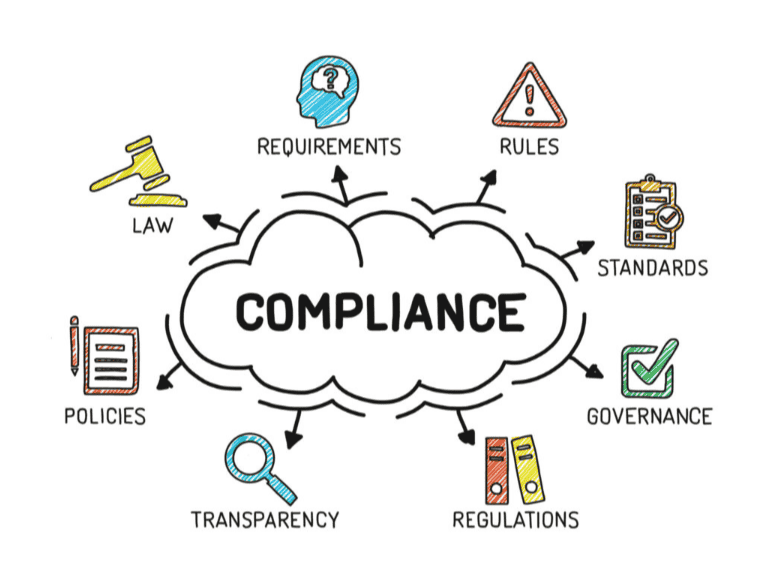
Legal and Compliance Software is crucial for real estate professionals, property managers, and firms to ensure that they adhere to industry regulations and legal requirements. Here are details and insights about these tools:
- Contract Management: Legal and compliance software often includes contract management features to create, store, and track real estate contracts, including purchase agreements, lease agreements, and property management contracts.
- Document Management: These tools provide secure document storage and organization, making it easy to access and retrieve legal documents, such as deeds, titles, and disclosure forms.
- Compliance Tracking: Legal and compliance software helps users track and manage compliance with industry regulations, such as fair housing laws, landlord-tenant laws, and property disclosure requirements.
- Electronic Signature Integration: Integration with digital signature platforms, like DocuSign or Adobe Sign, streamlines the process of obtaining electronic signatures on legal documents.
- Regulatory Compliance: Real estate professionals must comply with federal, state, and local regulations. Legal and compliance software helps users stay informed about and adhere to these regulations.
- Recordkeeping: The software often includes features for maintaining records of transactions, communications, and other legal documentation, which is critical for audits and legal disputes.
- Privacy and Data Protection: In an era of data privacy concerns, these tools ensure that client and transaction data is handled securely and in compliance with privacy regulations like GDPR or HIPAA.
- Risk Management: Legal and compliance software can help identify potential legal risks and provide guidance on how to mitigate them, reducing the likelihood of legal issues arising.
- Reporting: Users can generate reports to document compliance efforts, maintain transparency, and provide evidence of adherence to legal and regulatory requirements.
- Tenant and Lease Compliance: For property managers, these tools assist in ensuring that tenant leases and rental agreements comply with local laws and regulations.
- Property Inspection Compliance: Compliance software can help schedule and track property inspections to ensure they are conducted according to legal requirements and safety standards.
- Environmental Compliance: In cases where environmental regulations apply, these tools can assist with compliance monitoring, reporting, and documentation.
- Insurance Compliance: Real estate professionals often need to maintain appropriate insurance coverage. Compliance software can help track and manage insurance policies to ensure they meet legal requirements.
- Legal Research: Some legal and compliance software solutions offer access to legal research databases and resources to help professionals stay updated on relevant laws and regulations.
- Customization: Users can often customize these tools to align with their specific legal and compliance needs and the unique requirements of their real estate transactions.
Popular Legal and Compliance Software options include Clio, AppFolio, and Rent Manager for property management compliance, as well as specialized legal software like LexisNexis for legal research and document management. Choosing the right tool depends on the specific legal and compliance requirements of the real estate professional or firm. Legal and compliance software is essential for maintaining transparency, mitigating legal risks, and ensuring ethical and legal practices in the real estate industry.





Tham gia thảo luận